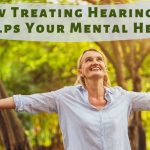Hearing loss is one of the most common medical conditions in older adults, affecting approximately 48 million Americans alone, according to the Hearing Loss Association of America (HLAA). It is believed to be strongly associated with poorer physical and mental health and well-being. People under the age of 70 are also at a higher risk of depression as a result of hearing loss.
To investigate the effects of treatment with a hearing aid or cochlear implant on older people with depressive symptoms, a study was conducted between researchers from American institutions of higher education at Johns Hopkins University, University of Oklahoma College of Medicine, and Drexel University. In collaboration they looked at the depressive symptoms of 113 people aged 50 years old or above.
Hearing Well Helps
People in the study were fitted with hearing aids (63 participants) and cochlear implants (50 participants) and their depressive symptoms were measured using the Geriatric Depression Scale (GDS), a validated and widely used 30-point self-assessment used to measure depression in the elderly.
According to the study, the questions on the GDS scale are used to assess the depressive symptoms of the elderly population and include yes or no questions. For example:
- “Are you basically satisfied with your life?”
- “Have you dropped many of your activities and interests?”
- “Do you often get bored?”
- “Are you in good spirits most of the time?”
- “Do you prefer to stay at home rather than going out and doing new things?”
The score ranges from 0 to 15 and various scores between 3 and 10 have been used as being suggestive of depression.
Six months later, the GDS score of the participants using hearing aids decreased by 28 percent and 31 percent by participants using cochlear implants. Researchers found that “treatment of hearing loss with hearing aids and cochlear implants may result in significant improvement in depression and mental health in older adults.”
It can be presumed that hearing aids and cochlear implants helped the participants remain active in their social behaviors and avoided isolation, which can lead to depression.
Hearing Loss and Depression
A previous study by the U.S. National Health and Nutritional Examination Survey found that hearing loss is associated with depression, particularly among women and people younger than 70 years of age. A 9-item Patient Health Questionnaire (PHQ-9) scale was used to assess depression and an audiometric examination was used to measure hearing impairment in participants, aged 18 or older, over the 5-year study.
The study found promising results that could encourage the use of hearing aids or cochlear implants to aid with hearing loss and lessen the risk of depressive symptoms. The prevalence of moderate to severe depression was 4.9 percent for people with excellent hearing, 7.1 percent for people with good hearing, and 11.4 percent for people who reported a little trouble or greater hearing loss, according to the study’s findings.
The results, according to researchers, are generally in line with the few studies published that have explored the effect of hearing loss treatment on depression. In those studies, various scales were used to demonstrate the significant decrease in scores, in addition to the GDS, when depressive symptoms were measured.
Seeking Treatment for Hearing Loss
The findings suggested that senior adults with hearing loss who use hearing aids or have cochlear implants exhibited improved depressive symptoms between the first 6 to 12 months of treatment. Though there is further study needed in this field, the researchers note that health care professionals may be able to improve the quality of life among those living with disabling hearing loss by recognizing signs and symptoms of depression and providing referrals to mental health services.
If you believe that you may be isolating yourself socially from friends and family, missing work often, and not caring for your well-being due to hearing loss, contact your health care professional. They will be able to provide you with resources to mental health services and also recommend an audiologist or other hearing health care specialist. An audiologist can evaluate your hearing loss and talk to you about treatments with hearing aids, cochlear implants, or other assistive devices and help you feel empowered again to find your back from depression.





